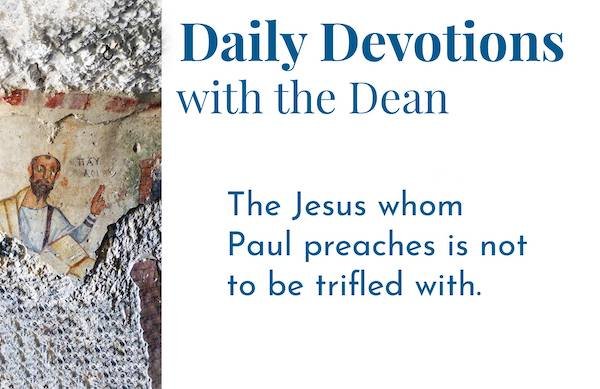Tuesday • 8/22/2023
Tuesday of the Twelfth Week After Pentecost (Proper 15)
This morning’s Scriptures are: Psalm 120; Psalm 121; Psalm 122; Psalm 123; 2 Samuel 18:9–18; Acts 23:12–24; Mark 11:27–12:12
This morning’s Canticles are: following the OT reading, Canticle 13 (“A Song of Praise,” BCP, p. 90); following the Epistle reading, Canticle 18 (“A Song to the Lamb,” Revelation 4:11; 5:9–10, 13, BCP, p. 93)
Welcome to Daily Office Devotions, where every Monday through Friday we draw insights from that day’s Scripture readings, as given in the Book of Common Prayer. I’m Reggie Kidd, and I’m grateful to be with you. This Tuesday in the Season After Pentecost our readings come from Proper 15 of Year 1 in the Daily Office Lectionary.
2 Samuel: Absalom’s very bad hair day. Absalom and his army have come after David, foolishly as it turns out. David still loves his wayward son and has told his generals, especially Joab his general-in-chief: “Deal gently for my sake with the young man Absalom” (2 Samuel 18:15).
Well, it doesn’t work out that way. Atop his royal mule in a thick forest, Absalom’s head gets stuck in a tree.
When I was a kid in Sunday School, this incident was authoritatively presented to me as Absalom’s long hair getting tangled in the thick branches of the oak. And it’s plausible. His great hair is the one detail of Absalom’s appearance the narrator has brought out to us — no doubt, it was a source of Absalom’s narcissistic pride. And it would be a delicious irony for the source of his conceit to be his demise. Still, the text doesn’t say exactly how his head got stuck — just that “his head caught fast in the oak, and he was left hanging between heaven and earth, while the mule that was under him went on” (2 Samuel 18:9).
Image: Centro Superior de Estudios de la Defensa Nacional - CESEDEN -, Public domain, via Wikimedia Commons
“Hanging in an oak,” that is, until Joab, against David’s orders, strikes him dead (that’s a score that David tells Solomon to settle after his own death—1 Kings 2:5–6).
Since the days of early Christian greats like Augustine, Bishop of Hippo (d. A.D. 430), we have been taught to ask difficult Old Testament passages about whether they do more than inform us about what happened. Perhaps these passages form our faith (what we should believe), our hope (what we should expect), and our love (how we should live).
What faith learns from Absalom’s very bad hair day. The Christian reader is virtually irresistibly drawn to the image of Another who hung from a tree (Acts 3:30) between heaven and earth. As the spiritual puts it:
I saw a man hanging on a tree
I was a man hanging on a tree
A lonely tree on Calvary
I saw a man hanging on a tree
Dying, suspended from a tree between heaven and earth, Absalom becomes yet one more “Easter egg” among many in the Old Testament that points ahead to Christ’s sacrifice. On Calvary, David’s greater Son is lifted upon a tree to offer himself in love for the sins of humankind and to draw all people to himself (John 3:14–16; 12:31–33).
What hope learns from Absalom’s very bad hair day. Absalom’s attractiveness to the people was less his hair than it was his promise to provide the justice and equity they had hoped for from his father: “Absalom used to rise early and stand beside the road into the gate; and when anyone brought a suit before the king for judgment, Absalom would call out … ‘See, your claims are good and right; but there is no one deputed by the king to hear you. … If only I were judge in the land! Then all who had a suit or cause might come to me, and I would give them justice’” (2 Samuel 15:2-4).
Hanging from a tree is the hope that the world’s true King, David’s greater Son — not a usurper, but the world’s true King; not a self-aggrandizer, but a foot-washer — will return to right all wrongs and make all things new.
At the same time, hanging from that tree is the hope that the narcissistic “old man” in each of us will one day be completely gone. Hope teaches us to pray: “thy Kingdom come, thy will be done on earth (including in us!) as it is in heaven.” It is a Kingdom we are not capable of manipulating or conjuring or forcing or dreaming or wishing into existence. But because that Kingdom has come in part with Christ’s death and resurrection, we hunger and thirst for its fullness. However, we can taste it in some measure, and we can let it infuse us and shape the way we live it, tell it, and invite others to join us in it. As Augustine said, “So long, then, as the heavenly City, is wayfaring on earth, she invites citizens from all nations and all tongues, and unites them into a single band” (City of God 15.17).
Tomorrow: What love learns from Absalom’s very bad hair day.
Be blessed this day,
Reggie Kidd+













